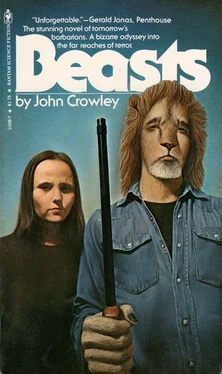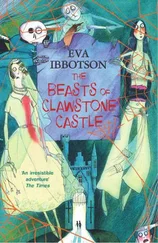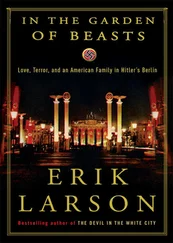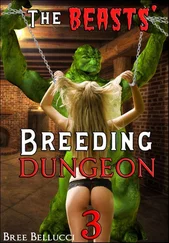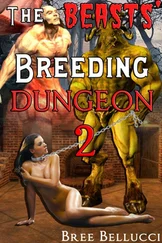John Crowley - Beasts
Здесь есть возможность читать онлайн «John Crowley - Beasts» весь текст электронной книги совершенно бесплатно (целиком полную версию без сокращений). В некоторых случаях можно слушать аудио, скачать через торрент в формате fb2 и присутствует краткое содержание. Город: New York, Год выпуска: 1978, ISBN: 1978, Издательство: Bantam Books, Жанр: Фантастика и фэнтези, на английском языке. Описание произведения, (предисловие) а так же отзывы посетителей доступны на портале библиотеки ЛибКат.
- Название:Beasts
- Автор:
- Издательство:Bantam Books
- Жанр:
- Год:1978
- Город:New York
- ISBN:978-0553111026
- Рейтинг книги:5 / 5. Голосов: 1
-
Избранное:Добавить в избранное
- Отзывы:
-
Ваша оценка:
- 100
- 1
- 2
- 3
- 4
- 5
Beasts: краткое содержание, описание и аннотация
Предлагаем к чтению аннотацию, описание, краткое содержание или предисловие (зависит от того, что написал сам автор книги «Beasts»). Если вы не нашли необходимую информацию о книге — напишите в комментариях, мы постараемся отыскать её.
Every hand is raised against the half-human, half-animal mutants who roam the desolate frontier. The lost, predatory creatures men call
BEASTS
Beasts — читать онлайн бесплатно полную книгу (весь текст) целиком
Ниже представлен текст книги, разбитый по страницам. Система сохранения места последней прочитанной страницы, позволяет с удобством читать онлайн бесплатно книгу «Beasts», без необходимости каждый раз заново искать на чём Вы остановились. Поставьте закладку, и сможете в любой момент перейти на страницу, на которой закончили чтение.
Интервал:
Закладка:
When the plane had been tied up, a single passenger got out. He hardly needed to stoop, so short he was. Leaning on a stick, he made his way down the gangway to the pier; sun and waterlight glinted from his spectacles. When he saw Loren he came toward him in his odd, mincing gait. Loren noticed that he limped now as well; he made the process of walking look effortful and improbable.
“Mr. Casaubon.” He removed the spectacles and pocketed them. “We’ve met. Briefly.”
Loren nodded guardedly. His small, week-divided world was shaken by this creature’s appearance. The beaten paths he had walked for months were about to be diverted. He felt unaccountably afraid. “What are you doing here?” He hadn’t intended to sound hostile, but did; Reynard took no notice.
“In the first place, to deliver this.” He took a travel-creased envelope from within his cape and held it toward Loren. Loren recognized, at once, the angular script; he had after all helped to shape it. Strange, he thought, how terrific is the effect of a fragment of him, outside myself, a genuine thing of his in the real world; how different than I imagine. This sense was the calm, self-observant eye of a storm of feeling. He took the letter from the strange, rufous fingers and put it away.
“And,” Reynard said, “I’d like to talk to you. Is there a place?”
“You’ve seen Sten.” The name caught in his throat and for a horrible moment he thought it might not come out. He had no idea how much the fox knew. He felt naked, as though even then telling all; as though his racing pulse were being taken.
“Oh yes, I’ve seen Sten,” Reynard said. “I don’t know what he’s written you, but I know he wants to see you. He sent me to bring you.”
Loren hadn’t risen, not certain his legs would hold him; still, within, that calm eye observed, astonished at the power of a letter, a name, that name in another’s mouth, to cause havoc in the very tissues and muscles of him.
“There’s a bar up the street,” he said. “The Yukon. Not the New Yukon. A back room. Go on up there. I’ll be along.”
He watched Reynard stick his way up the street. Then he turned away and sat looking out across the water as though he still waited for something.
After Gregorius had been murdered, the three of them — Sten, Mika, and Loren — began gradually to move into the big house. They took it over by degrees as Gregorius’s spirit seemed to leave it; the kitchen first, where they ate, where the cook stuffed Sten and Mika out of pity for their orphanhood (though what Mika felt was not grief but only the removal of something, something that had been a permanent blockage at the periphery of vision, a hobble on the spirit; she had hardly known Gregorius, and liked him less). Next they moved into the living quarters, spreading out from their own nursery wing like advancing Mongols into the lusher apartments. The movement was noticed and disapproved of by the maids and housekeepers, for as long as they remained; but Nashe, utterly preoccupied with her own preservation and the prevention of anarchy, hardly noticed them at all. Now and then they would see her, hurrying from conference to conference, drawn with overwork; sometimes she stopped to speak.
The government was finally withdrawn altogether from the house and moved back to the capital. Nashe hadn’t the personal magnetism to rule from seclusion, as Gregorius had done; and she didn’t have Reynard for a go-between. She knew also that she had to dissociate herself from Gregorius; the memory of a martyr — even if most people weren’t sure just what he had been martyred for, there were reasons enough to choose from — could only burden her. And Sten Gregorius must not figure in her story at all. At all. A small number of men in Blue continued to patrol the grounds; the children saw them now and again, looking bored and left over. The house belonged to the three of them.
Loren continued to be paid, and continued to teach, though he became less tutor than father, or brother — something else, anyway, inexorably. There had been a brief meeting with Nashe in which the children’s future was discussed, but Nashe had not had her mind on it, and it ended inconclusively. Loren felt unaccountably relieved. Things would go on as they had.
There was a sense in which, of course, Sten at least was not an inheritor but a prisoner. He knew that, though he told no one what he knew. Except when this knowledge bore down on him, paralyzingly heavy, he was happy: the two people in the world he loved most, and who loved him unreservedly, were with him constantly. There were no rules to obey except his own, and Loren’s, which came to the same thing. Sten knew that, with his father dead and Nashe departed, Loren drew all his power from the children’s consent. But Loren’s rules were the rules of a wise love, the only Sten had ever known, to be haggled over, protested sometimes, but never resented. He wondered sometimes, times when he felt at once most strong and most horribly alone, when it would happen that he would overthrow Loren. Never! his heart said, as loud as it could manage to.
Still there were lessons, and riding; less riding when winter began to close down fully and snow piled up in the stony pastures and ravines. Loren spent a long time trying to repair an ancient motor-sled left in a garage by the mansion’s previous inhabitants.
“No go,” he said at last, “I’ll call somebody in the capital. They can’t refuse you a couple of motorsleds.
“No,” Sten said. “Let’s just snowshoe. And ski. We don’t need them”
“They really more or less owe it to you.”
“No. It’s all right.”
Later that month four new sleds arrived as a gift from a manufacturer; arrived with a hopeful photographer. Sten warily, ungraciously, accepted the sleds. The photographer was sent away, without Sten’s picture, or his endorsement. The sleds were locked in the old garage.
Evenings they usually spent in the dim of the communications room, where deep armchairs deployed themselves around big screens and small monitors. They watched old films and tapes, listened to political harangues, watched the government and the religious channels. It didn’t seem to matter. The droning flat persons were so far from them, so unreal, that it only increased their sense of each other. They could laugh together at the fat and the chinless and the odd who propounded to them the nature of things — Mika especially had no patience with rhetoric and a finely honed sense of the ridiculous — and the fat and the chinless and the odd, hugely enlarged or reduced to tininess by the screens, never knew they laughed. They could be extinguished by a touch on a lighted button. The whole world could be. It was a shadow. Only they three were real; especially when the heat failed in fuel shortages and they huddled together in a single thronelike chair, under a blanket.
Nashe was a fairly frequent shadow visitor in the communications room.
“Here’s the straight pin,” Mika said. Somehow this description of Mika’s was hilariously apt, though none of them knew exactly why.
“She’s got a hard job,” Loren said. “The hardest.”
“But look at that nose .”
“Let’s listen a minute,” Sten said, serious. They all knew their fate was, however remotely, connected to this woman’s. Sten felt it most. They must, sometimes, listen.
She was being asked a question about the Genesis Preserve. “Whatever crimes may have been committed within its borders are no concern of the Federal government,” she said in her dry, tight voice. “Our longstanding agreements with the Mountain give us sole authority — at the Mountain’s request — to enter it and deal with criminal activities… No, we have had no such request…. No, it doesn’t matter that it’s a so-called Federal crime, if that phrase has any legal meaning anymore. I can only interpret all of this as an attempt by the Federal and the Union for Social Engineering to gain some quasi-legal foothold within this Autonomy. As Director, I cannot countenance that.” She seemed to have to do that — announce her status — fairly frequently. “We know, I think, too much about USE to countenance any such activities.” At least, Sten thought, she’ll keep USE out. She’s got to fight them, take positions against them, because she benefited from their act, or what everybody thinks is their act. She can’t make them illegal in the Autonomy, they’re too strong for that. But she’ll fight. Sten had inherited Loren’s loathing of the intense men and women with their plastic briefcases and mechanical voices.
Читать дальшеИнтервал:
Закладка:
Похожие книги на «Beasts»
Представляем Вашему вниманию похожие книги на «Beasts» списком для выбора. Мы отобрали схожую по названию и смыслу литературу в надежде предоставить читателям больше вариантов отыскать новые, интересные, ещё непрочитанные произведения.
Обсуждение, отзывы о книге «Beasts» и просто собственные мнения читателей. Оставьте ваши комментарии, напишите, что Вы думаете о произведении, его смысле или главных героях. Укажите что конкретно понравилось, а что нет, и почему Вы так считаете.
